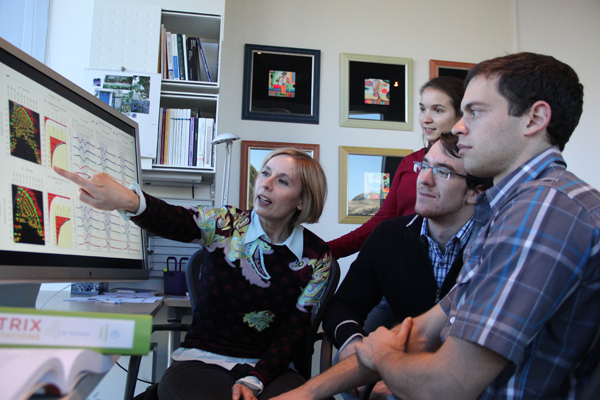
NCI Grant for Personalized Cancer Diagnostics and Prognostics to Alter and Team
Orly Alter has been awarded a five-year, three million-dollar National Cancer Institute (NCI) grant for the project “Multi-Tensor Decompositions for Personalized Cancer Diagnostics and Prognostics.” Co-investigators on her team include pathology professors Cheryl A. Palmer and Carl T. Wittwer, associate professor Elke A. Jarboe, and clinical assistant professor Reha M. Toydemir, and neurosurgery professor Randy L. Jensen.
Alter, a bioengineering associate professor and a faculty member of the Scientific Computing and Imaging Institute, pioneered the matrix and tensor modeling of large-scale molecular biological data, which have been demonstrated to correctly predict previously unknown cellular mechanisms.
In this project, Alter’s team is developing new mathematical frameworks to do what no others can, namely, to create a single coherent model from multiple high-dimensional datasets, known as tensors, by simultaneously finding similarities and dissimilarities across the datasets. They are using the frameworks to compare and contrast datasets recording different aspects of a single disease, such as genomic profiles of multiple cell types from the same set of patients, measured more than once by several different methods. By using the complex structure of the datasets, rather than simplifying them as is usually done, the frameworks enable the separation of patterns of DNA alterations – which occur only in the tumor genomes – from those that occur in the genomes of normal cells in the body, and from variations caused by experimental inconsistencies. The patterns that they uncover in the data are expected to offer answers to the open question of how a tumor’s genome affects a patient’s outcome.
For example, recent comparisons of the genomes of tumor and normal cells from the same sets of ovarian and, separately, glioblastoma brain cancer patients uncovered patterns of DNA copy-number alterations that were found to be correlated with a patient’s survival and response to chemotherapy. For three decades prior, the best predictor of ovarian cancer survival was the tumor’s stage. More than a quarter of ovarian tumors are resistant to the platinum-based chemotherapy, the first-line treatment, yet no diagnostic existed to distinguish resistant from sensitive tumors before the treatment. For five decades prior, the best prognostic indicator of glioblastoma was the patient’s age at diagnosis. The ovarian and brain cancer data were published, but the patterns remained unknown for years until Alter’s team applied their mathematical frameworks.
Pending experimental revalidation, the team will bring the patterns that they uncover to the clinic, to be used in personalized diagnostic and prognostic pathology laboratory tests. The tests would predict a patient’s survival and response to therapy, and doctors could tailor treatment accordingly. With this project, the University of Utah joins the NCI’s Physical Sciences in Oncology Network.
For more see the project website at
https://physics.cancer.gov/network/UniversityofUtah.aspx
.